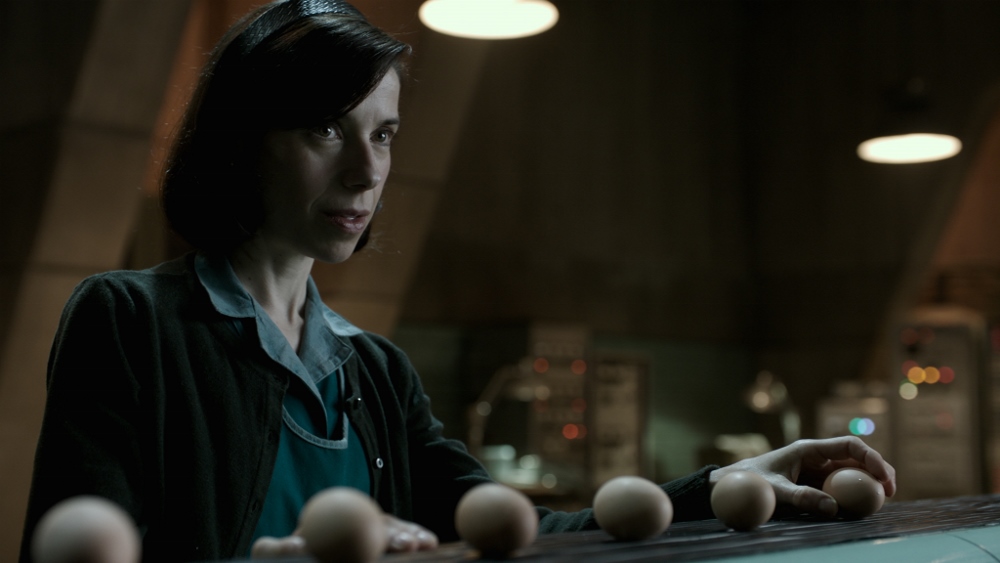
In The Shape of Water, Guillermo Del Toro has created a strange, beautiful, and mysterious film imbued with the power of myth and a sense of wonder. It’s a monster movie with a tantalizing twist, a Cold War era espionage period piece with precise, enticing and often humorous visual detail, an imaginative and deeply satisfying romantic fantasy. Unlike many films where the monster is defined as wrong, his difference and otherness seen only as negative, a problem to be solved either by the monster’s death (Creature from the Black Lagoon, King Kong, Frankenstein) or transformation (Beauty and the Beast), here, “other” is not defined as “wrong,” but merely as different.
Fulfilling one of my cinematic desires, Elisa Esposito (Sally Hawkins) is one of the very rare truly strong female leads in a film. Often, when filmmakers attempt to create a strong female character their world view and imagination fails them, and the character ends up being simply mean and aggressive rather than possessing inner strength. In Elisa, a mute cleaning lady at a high-security science lab, Guillermo Del Toro has created a character who conveys a sense of a rich, inner life, with empathy and generosity towards others, a sense of aesthetics, fun, and humor, as well as the conviction of her beliefs, and the willingness to take risks. In a lovely symbolic touch, Elisa Esposito is a woman with an individual and powerful voice, all this without a word spoken. Sally Hawkins is phenomenal in this role, quirky, expressive, and radiant. She is the locus of desire and agency, her sexuality as much a natural expression of her individuality as her love for shoes and the music of Benny Goodman. In Elisa, as in many of the film’s other characters, there is a sense of loneliness, a longing to be seen, accepted, and loved. Yet her sensitivity and vulnerability does not detract from her strength, or her ability to take action.
The film’s design is riveting, capturing not only the feel of the era (1962), but the sense of immersion in water, with its palette of muted greens and blues. The creature captured in the Amazon river and referred to by the scientists as “the asset” is a marvel of design and Doug Jones’ portrayal of the aquatic enigma, at once alien and elegant, mysterious and sensual. It is to Del Toro’s credit that a sense of mystery remains throughout the film. The unanswered questions lending it a fairytale, mythic quality. The feel of water, with its blurring of clear edges and boundaries informs the film visually, reflecting its themes. As the tension and suspense rise, so do the waters.
The Shape of Water is also informed by a love of film, its ability to enchant and inspire. Elisa lives above a movie theatre and watches oldies with her neighbor Giles (Richard Jenkins). The two outsiders, each for his/her own reason, share a world of their own, shaped by kindness, art, and whimsy. In one of the film’s many bright moments, Elisa and Giles do an impromptu duet, sweet and elegant. It is, in this writer’s opinion, an almost perfect film, transcending so many clichés and deftly avoiding the blind spots of prejudice. The one hiccup, that is perhaps unavoidable, is in the choice of Zelda (Octavia Spencer), as Elisa’s friend at work. Octavia Spencer is fantastic in the role, and therefore redeems it from the very predictable structure of the prototypical verbose black cleaning lady. If there is one black character in a film, and that character is employed in service work, it gives me pause. Yet it must be acknowledged that in terms of its era, it is apt, and perhaps compensated for by Octavia Spencer and Sally Hawkins providing this film with two strong female characters, which is quite an abundance.
The Shape of Water is an immersive, sensual, and deeply moving experience. This is a film to be savored on the largest screen possible.
The Shape of Water
Director: Guillermo Del Toro; Screenplay: Del Toro and Vanessa Taylor, from a story by Del Toro; Cinematography: Dan Laustsen; Editor: Sidney Wolinsky; Music: Alexandre Desplat; Cast: Sally Hawkins, Michael Shannon, Richard Jenkins, Octavia Spencer, Doug Jones, Michael Stuhlbarg, David Hewlett, Nick Searcy, Stewart Arnott, Nigel Bennett, Morgan Kelly.





